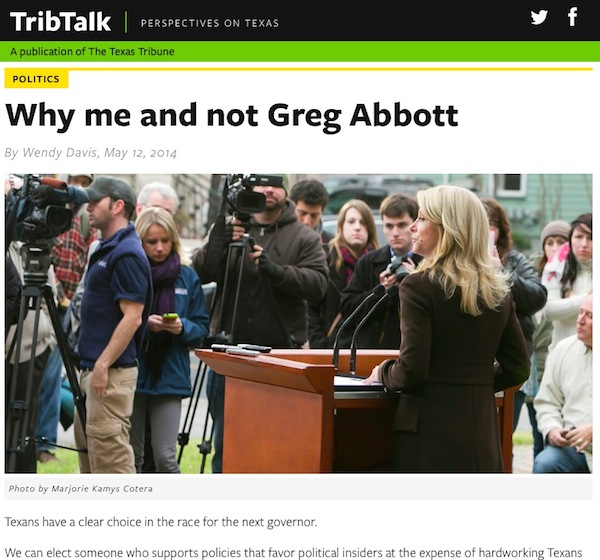Well, it launched today. Tribune editor (and, full disclosure, my former colleague at The Dallas Morning News) Emily Ramshaw:
TribTalk will feature pointed, provocative perspectives on Texas politics and policy — from campaigns and elections to education, health care, immigration, transportation, criminal justice, energy and the environment. The thought leaders who write for the site will be both well known and unsung, predictable and unexpected, established and emerging. We hope their contributions will make for the same compelling reading, viewing and listening you’ve come to expect from the Tribune. We’re also accepting columns submitted by readers like you. If you’d like to write for TribTalk, learn how here.
The TribTalk media kit has further details: looks like $2,500 for a piece of sponsored content that’ll be on TribTalk’s homepage for three days and $12,500 for a rich-media, large-format ad that’ll run for 30 days. Sponsored posts will have comments open (moderated by TribTalk staff, not the advertiser) and will stay online indefinitely, unlike at some other outlets where the url is taken down when the paid period ends.
Sponsored content makes journalists feel uneasy, often for good reason — the idea that the ad’s similarity to editorial content is a selling point doesn’t give reporters the warm fuzzies. The TribTalk media kit rides that difficult edge, saying on one hand:
The treatment and design of sponsored content will be clearly differentiated from other submitted and solicited op-eds.
…but also:
Sponsored content will mirror the design of the rest of the site’s content and reside in line with it, offering the same functionality as editorial content.
If you’re looking at the TribTalk homepage, the paid posts are pretty well distinguished, visually:

But on the article page level, I wouldn’t be shocked if the relatively minor cues — a small Paid Placement banner at top and a grey background — weren’t significant to make it clear what’s paid and what’s not. Imagine reaching one of these articles from a link on Twitter — I think there’s a good chance you wouldn’t pick up on the fact that the second one is an ad.


Still, the TribTalk site looks different enough from the (more handsome) main Tribune site that I don’t think the main brand would face much blowback from a misstep. (Consider the contrast with, say, The New York Times’ paid post efforts. At the Times, the straight news and the op-eds look a lot alike, but the paid posts look quite different; at the Tribune, the op-eds and the paid posts look a lot alike, but the straight news looks quite different.)
The Trib’s success is deeply tied with the corporate financial power that surrounds around Texas state government. It gets a substantial share of its revenue from them — more than $2 million from corporate underwriting and sponsored events last year — and the presence of all that money helps makes its model more viable than it might be in, say, Helena or Pierre. If you don’t like that, you’re not likely to like TribTalk. If that doesn’t bother you — if you see this form as just another kind of advertorial, or if you think that revenue paying for a lot of very good journalists is an acceptable tradeoff — then you probably won’t mind it.
One comment:
It’s kind of nice to have journalism free of the visually godawful ads. Hopefully readers/viewers will be able to think critically about the form/content. But “thought leaders” – c’mon, Texas, Twitter was already bashing this buzzword about before launch. Bump up your content if you want content to be taken seriously, regardless if that content is written or visual form.
Trackbacks:
Leave a comment